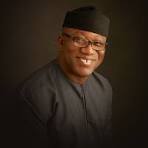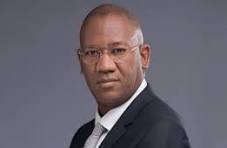When you hear the name Kayode Fayemi, what comes to mind? For many, it’s a calm, well-spoken intellectual who’s just as comfortable in a lecture hall as he is in a political arena. But dig a little deeper, and you’ll find a man who has quietly shaped Nigeria’s democracy through policy, diplomacy and big ideas.
Born in 1965 in Ibadan, Oyo State, but of Ekiti origin, Fayemi is not your everyday politician. He doesn’t shout the loudest or thrive on political drama. Instead, he works behind the scenes — reading, writing, thinking, and pushing for change through strategy rather than noise. He’s one of the few Nigerian politicians who genuinely wears the tag “intellectual” with meaning.
His academic journey took him far and wide — from the University of Lagos to Obafemi Awolowo University and later, King’s College London, where he earned a doctorate in War Studies. That tells you something about his mind: sharp, strategic and deeply analytical. Before diving into politics, Fayemi worked as a journalist, researcher and human rights advocate — roles that shaped his later approach to governance.
Fayemi first came into political limelight when he became Governor of Ekiti State in 2010, after a long legal battle. He lost re-election in 2014 but bounced back in 2018 — a rare political comeback. While in office, he wasn’t known for flashy projects, but for trying to build lasting systems: education reform, social protection programmes, and infrastructure rooted in long-term planning.
As Chairman of the Nigeria Governors’ Forum (NGF) from 2019 to 2023, he earned respect across party lines. Colleagues often describe him as a bridge-builder — a man who listens more than he talks, and who prefers dialogue to conflict. Under his leadership, the NGF became more than just a meeting of state governors; it became a platform for serious policy discussions.
But Fayemi is not without critics. Some see him as too elitist, too bookish — disconnected from the gritty political street fights that define Nigerian politics. Others say his calm demeanour sometimes makes him appear aloof or too slow to act in crisis. Still, even his critics admit he brings something different to the table — ideas.
Now out of public office, Fayemi remains influential in policy and academic circles. He speaks at conferences, advises on governance issues, and continues to write. Many believe he’s far from done with politics — perhaps eyeing a bigger national role in the future.
One thing is certain: Kayode Fayemi is not your typical Nigerian politician. He’s proof that brains still matter in leadership — and that quiet thinkers can sometimes shake the system in the most powerful ways.





